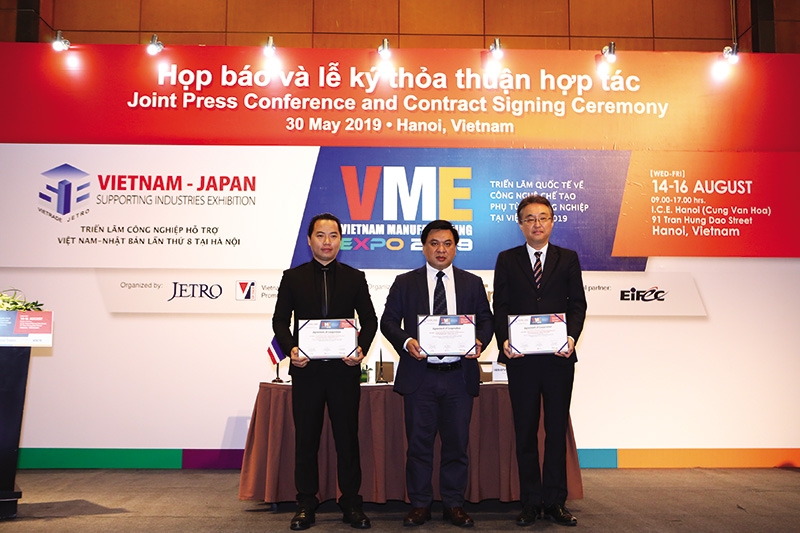Reed Tradex signs for Japanese expos
 |
| Reed Tradex will host two of the largest Japanese-Vietnamese expos |
Currently, Vietnam has diplomatic relations with 187 countries, and economic and trade co-operation with 224 countries and territories. The country has 16 free trade agreements signed or under negotiation with 58 partners from Asia, Europe, the Americas, and the Middle East. Besides, Vietnam also has nearly 60 bilateral investment promotion and protection agreements to support domestic businesses in going global.
“Taking the role as one of the leading organisations in the region for connecting businesses through international conferences and exhibitions, Reed Tradex is honoured to co-operate with the Japan External Trade Organization (JETRO) in Hanoi and the Department of Trade Promotion under the Ministry of Industry and Trade to bring this event as a networking opportunity for enterprises, as well as support the links between manufacturers and companies related to the country’s supporting industries,” said Phan Ngan, project manager of Reed Tradex Vietnam.
Currently, the process of strengthening business operations and optimising resources has accelerated dramatically. Apart from challenges caused by global economic instability, such as flexible exchange rate policies, and strict regulation and monitoring in financial systems, the trend of production relocation from China to Vietnam is also bringing a host of opportunities to businesses that keep abreast of the latest changes, according to Reed Tradex.
Chief representative of the JETRO in Hanoi, Hironobu Kitagawa, said that the localisation for materials, components, and spare parts of Japanese businesses in Vietnam is 36.3 per cent, while the rates for China and Thailand are 68 and 57 per cent, respectively. Thus, businesses have to import materials, components, and spare parts from neighbouring countries like Thailand or China. “This leads to increasing costs and high risks for Japanese investors with operations in the Vietnamese manufacturing industry, and difficulties in maintaining medium- and long-term production activities in Vietnam,” Kitagawa said.
In addition, the supporting industries are largely undertaken by small- and medium-sized enterprises (SMEs), he continued. “Restrictions on mechanisms and policies to support SMEs are an issue that we are encountering in Vietnam. If the problem is solved, there will be more Japanese investors eyeing the manufacturing and supporting industries here.”
According to Le Hoang Tai, deputy director general of the Department of Trade Promotion, the supporting industries play a vital role in developing a competitive and sustainable industry. With this, the government has assigned the Ministry of Industry and Trade to actively implement the Supporting Industry Development Programme until 2025. “Vietnamese supporting enterprises are fully facilitated to apply modern quality management standards, improve product quality, participate deeply in the global supply chain, and increase the localisation rate in significant industries such as automobiles, textiles, footwear, and electronics,” Tai said.
Only 21 per cent of Vietnamese SMEs have successfully participated in global value chains, manifestly low compared to the 46 per cent of other ASEAN members.
Despite the fact that a wide range of key worldwide manufacturers have set their production in Vietnam and provided the manufacturing and supporting industries with opportunities, without co-operation, Vietnamese businesses still struggle to join these global supply chains. To bolster relationships between large foreign corporations and local SMEs, the United States Agency for International Development has decided to implement the LinkSME project for the 2018-2023 period with the total budget of $22.1 million.
The project catalyses systemic changes in these business relations, significantly increasing the quantity and quality of links between Vietnamese enterprises and global value chains. Improved and increased business links will help Vietnamese private companies leverage business competitiveness, increase job creation and economic growth, and encourage entrepreneurial innovation.
What the stars mean:
★ Poor ★ ★ Promising ★★★ Good ★★★★ Very good ★★★★★ Exceptional
 Tag:
Tag:
Related Contents
Latest News
More News
- State corporations poised to drive 2026 growth (February 03, 2026 | 13:58)
- Why high-tech talent will define Vietnam’s growth (February 02, 2026 | 10:47)
- FMCG resilience amid varying storms (February 02, 2026 | 10:00)
- Customs reforms strengthen business confidence, support trade growth (February 01, 2026 | 08:20)
- Vietnam and US to launch sixth trade negotiation round (January 30, 2026 | 15:19)
- Digital publishing emerges as key growth driver in Vietnam (January 30, 2026 | 10:59)
- EVN signs key contract for Tri An hydropower expansion (January 30, 2026 | 10:57)
- Vietnam to lead trade growth in ASEAN (January 29, 2026 | 15:08)
- Carlsberg Vietnam delivers Lunar New Year support in central region (January 28, 2026 | 17:19)
- TikTok penalised $35,000 in Vietnam for consumer protection violations (January 28, 2026 | 17:15)






















 Mobile Version
Mobile Version